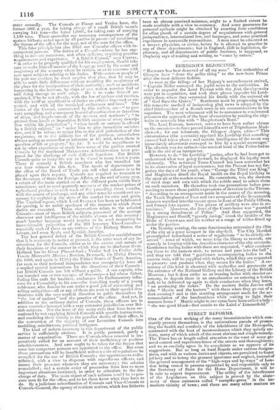EGREGIOUS REJOICINGS.
" RICUARD has best deserved of all my sons." The authorities of Glasgow have "done the polite thing" to the new-born Prince after the most delicate fashion.
As soon as the tidings of her Majesty's accouchement arrived, " Captain Millar conveyed the joyful news to the authorities. In order to acquaint the Lord Provost with the fact, the city-waits were put in requisition, and took their places opposite his Lord- ship's door, where they serenaded his family with the national air of God Save the Queen." Sentiment must be progressing when this romantic method of insinuating glad news is adopted by the chief thief-catcher , of a Scotch town in his communications to his superiors. The next refinement will be to announce to condemned prisoners the approach of the hour of execution by sending the city- waits to serenade hina with " Maepherson's Rant." The Lord Provost, however, seems to have been rather obtuse on the occasion—to have proved himself a sort of Triptolemus Mud- dlework ; for our informant, the Glasgow Argus, adds—" Wit circumstance (the serenade) apprized his Lordship that something unusual had taken place ; and certain, intelligence of the event was immediately afterwards conveyed to him by a special messenger." The allusion was too refined—the musical head of the Police had to call in the aid of an interpreter.
However, to do "his Lordship "justice, after he had been got to understand what was going forward, he displayed his loyalty most valorously. The reformed Town-Council has been somewhat lax in its observation of loyal ceremonies-' but the Provost has not for- gotten the days of his youth, when "George the Third was King," and Magistrates drank the Royal health on the Royal birthday in the open air at the market-cross. He remembers, too, the showers of dead dogs and cats with which the rabble used to salute them on such occasions. He therefore took due precautions before pro- ceeding to renew those public expressions of devotion to the Throne. "According to an arrangement made in the course of the morning, the Tenth Regiment of Foot and two companies of the Seventeenth Lancers marched into the vacant space in front of the Public Offices, and formed into sguare. Two pieces of artillery were also in at tendance." Moreover, the front of the Court-house was "guarded by a strong detachment of Police." And thus supported, the Magistrates and Sheriff; "greatly daring," drank the healths of the Duke of CORNWALL and his mother at a range of tables fitted up under the portico.
On Monday evening, the same functionaries entertained the elite of the city at a great banquet in the city-hall. The City Marshal promulgated beforehand a series of regulations "to be strictly ob- served' ; some of which, we must take the liberty to remark, are scarcely in keeping with the Arcadian character of the city serenade, Gentlemen having ladies with them are requested, "after conducts ing them to the eastern stair, to return and pass into the hail"; and they are told that "gentlemen accompanying ladies to the eastern stair, will be supplied with tickets, which they are requested to preserve and produce when they return for the ladies." A ce- remony of this kind is observed with -umbrellas and ,greatcoats at the entrance of the National Gallery and the Library of the British Museum ; but it does strike us as treating ladies with slender ce- remony, to deposit them in an antechamber on entering a festive hall, to be delivered up again "to their conductors when they leave, "on producing the ticket." Do the modern Bailie Jarvies still take "Mettle and the lantern" with them when they go out ofa dark evening ? and is this startling arrangement made for the ac- commodation of the handmaidens while waiting to light their masters home ? Mattie might in One sense have been called a lady : "she was good blood—first cousin to the Laird o' Limmerfield:


























 Previous page
Previous page